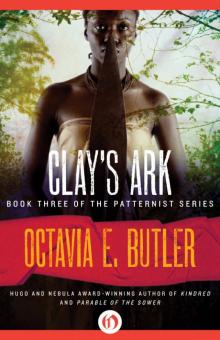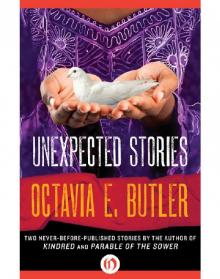- Home
- Octavia E. Butler
Lilith's Brood: Dawn, Adulthood Rites, and Imago (Xenogenesis Trilogy) Page 14
Lilith's Brood: Dawn, Adulthood Rites, and Imago (Xenogenesis Trilogy) Read online
Page 14
“If you have to do something, it might as well feel good,” Nikanj had told her. It had become very interested in her physical pleasures and pains once its sensory arms were fully grown. Happily, it had paid more attention to pleasure than to pain. It had studied her as she might have studied a book—and it had done a certain amount of rewriting.
The bulge in the wall felt large and distinct when her fingers found it. But when she opened her eyes and looked, she could not see any irregularity.
“There’s nothing there!” Tate said over her right shoulder.
Lilith jumped, dropped the picture, refused to turn and glare at Tate as she bent to pick it up. “Get away from me!” she said quietly.
Grudgingly, Tate moved back several steps. Lilith could have found the spot again without any particular concentration, without having Tate move away, but Tate had to learn to accept Lilith’s authority in anything to do with controlling the walls or dealing with the Oankali and their ship. What the hell did she think she was doing, coming back, creeping along behind Lilith? What was she looking for? Some trick?
Lilith rubbed one hand on the face of the picture and placed it against the wall. She found the bulge at once, though it was still too slight to be seen. It had ceased to grow with the removal of the picture, but had not yet vanished. Now Lilith rubbed it gently with the picture, encouraging it to grow. When she could see the protrusion, she stepped away and waited, gesturing for Tate to come.
Standing together, they watched the wall disgorge the long, translucent green plant. Tate made a sound of disgust and stepped back as the smell drifted to her.
“You want to look at it before I open it?” Lilith asked.
Tate came closer and stared at the plant. “Why is it moving?”
“So that every part of it is exposed to the light for a while. If you could mark it, you would see that it’s very slowly turning over. The movement is supposed to be good for the people inside, too. It exercises their muscles and changes their position.”
“It doesn’t really look like a slug,” Tate said. “Not when someone’s in it.” She went to it, stroked it with several fingers, then looked at her fingers.
“Be careful,” Lilith told her. “Celene isn’t very big. The plant probably wouldn’t mind taking someone else in.”
“Would you be able to get me out?”
“Yes.” She smiled. “The first Oankali to show these to me didn’t warn me. I put my hand on the plant and almost panicked when I realized the plant was holding me and growing around my hand.”
Tate tried this, and the plant obligingly began to swallow her hand. She tugged at her hand, then looked at Lilith, obviously afraid. “Make it let go!”
Lilith touched the plant around her captive hand and the plant released her. “Now,” Lilith said, moving to one end of the plant. She drew her hands along the length of the plant. It opened in its usual slow way, and she lifted Celene out and put her on the floor where Tate could look after her.
“Get some clothes on her before she wakes up if you can,” she told Tate.
But by the time Celene was fully awake, Lilith had Leah Bede out of the wall and out of her plant. She dressed Leah quickly. Not until both women were fully awake and looking around did Lilith push the two plants back through the wall. When that was done, she turned, meaning to sit down with Leah and Celene and answer their questions.
Instead, she was suddenly staggered by Leah’s weight as the woman leaped onto her back and began strangling her. Lilith began to fall. Time seemed to slow down for her.
If she fell on Leah, the woman would probably injure her back or her head. The injury might be only superficial, but could be serious. It would be wrong to let a potentially useful person be lost for one act of stupidity.
Lilith managed to fall on her side so that only Leah’s arm and shoulder struck the floor. Lilith reached up and took Leah’s hands from her throat. It was not difficult. Lilith was even able to go on taking care not to cause injury. She also took care not to let Leah see how easy it was for Lilith to defeat her. She gasped as she tore Leah’s hands from her throat, though she was nowhere near desperate for air yet. And she allowed Leah’s hands to move in her own as Leah struggled.
“Will you stop it!” she shouted. “I’m a prisoner here just like you. I can’t let you out. I can’t get out myself. Do you understand?”
Leah stopped struggling. Now she glared up at Lilith. “Get off me.” Her voice was naturally deep and throaty. Now it was almost a growl.
“I intend to,” Lilith said. “But don’t jump me again. I’m not your enemy.”
Leah made a wordless sound.
“Save your strength,” Lilith said. “We’ve got a lot of rebuilding to do.”
“Rebuilding?” Leah growled.
“The war,” Lilith said. “Remember?”
“I wish I could forget.” The growl had softened.
“You kill me here and you’ll prove you haven’t had enough war yet. You’ll prove you’re not fit to take part in the rebuilding.”
Leah said nothing. After a moment, Lilith released her.
Both women stood up warily.
“Who decides whether or not I’m fit?” Leah asked. “You?”
“Our jailers.”
Unexpectedly, Celene whispered, “Who are they?” Her face was already streaked with tears. She and Tate had come up silently to join the discussion—or watch the fight.
Lilith glanced at Tate, and Tate shook her head. “And you were afraid Awakening a man would cause violence,” she said.
“I still am,” Lilith told her. She looked at Celene, then Leah. “Let’s get something to eat. I’ll answer any questions I can.”
She took them to the room that would be Celene’s and watched their eyes widen when they saw, not the expected bowls of god-knew-what, but recognizable food.
It was easier to talk to them when they’d eaten their fill, when they were relatively relaxed and comfortable. They refused to believe they were on a ship beyond the moon’s orbit. Leah laughed aloud when she heard that they were being held by extraterrestrials.
“Either you’re a liar or you’re crazy,” she said.
“It’s true,” Lilith said softly.
“It’s crap.”
“The Oankali modified me,” Lilith told her, “so that I can control the walls and the suspended animation plants. I can’t do it as well as they can, but I can Awaken people, feed them, clothe them, and give them a certain amount of privacy. You shouldn’t get so wrapped up in doubting me that you ignore the things you see me do. And remember two things in particular that I’ve told you. We are on a ship. Act as though you believe that even if you don’t. There is no place to run on a ship. Even if you could get out of this room, there would be nowhere to go, nowhere to hide, nowhere to be free. On the other hand, if we endure our time here, we’ll get our world back. We’ll be put down on Earth as the first of the returning human colonists.”
“Just do as we’re told and wait, huh?” Leah said.
“Unless you like it here well enough to stay.”
“I don’t believe a word you say.”
“Believe what you want! I’m telling you how to act if you ever want to feel the ground under your feet again!”
Celene began to cry quietly and Lilith frowned at her. “What’s the matter with you?”
Celene shook her head. “I don’t know what to believe. I don’t even know why I’m still alive.”
Tate sighed and shook her head in disgust.
“You are alive,” Lilith said coldly. “We have no medical supplies here. If you want to commit suicide, you might succeed. If you want to hang around and help get things started back on Earth … well, that seems a lot more worth succeeding at.”
“Did you have any children?” Celene asked, clearly expecting the answer to be no.
“Yes,” Lilith made herself reach out, take the woman’s hand, though already she disliked her. “All the people I have t
o Awaken are here without their families. We’re all alone. We’ve got each other, and nobody else. We’ll become a community—friends, neighbors, husbands, wives—or we won’t.”
“When will there be men?” Celene demanded.
“In a day or two. I’ll Awaken two men next.”
“Why not now?”
“No. I’ll get rooms ready for them, get food and clothing out for them—the way I have for you and Leah.”
“You mean you build the rooms?”
“It’s more accurate to say I grow them. You’ll see.”
“You grow the food, too?” Leah asked, one eyebrow raised.
“Food and clothing is stored along the walls at each end of the big room. They’re replaced as we use them. I can open the storage cabinets, but I can’t open the wall behind them. Only the Oankali can do that.”
There was silence for a moment. Lilith began gathering her own fruit peelings and seeds. “Any garbage goes into one of the toilets,” she said. “You don’t have to worry about stopping them up. They’re more than they appear to be. They’ll digest anything that isn’t alive.”
“Digest!” Celene said, horrified. “They … they’re alive themselves?”
“Yes. The ship is alive and so is almost everything in it. The Oankali use living matter the way we used machinery.” She started away toward the nearest bathroom, then stopped. “The other thing I meant to tell you,” she said focusing on Leah and Celene, “is that we’re being watched—just as we were all watched in our isolation rooms. I don’t think the Oankali will bother us this time—not until forty or more of us are Awake and getting along fairly well together. They will come in, though, if we start to murder each other. And the would-be murderers—or actual murderers—will be kept here on the ship for the rest of their lives.”
“So you’re protected from us,” Leah said. “Convenient.”
“We’re protected from one another,” Lilith said. “We’re an endangered species—almost extinct. If we’re going to survive, we need protection.”
4
LILITH DID NOT RELEASE Curt Loehr from his suspended animation plant until Joseph Shing’s plant lay beside it. Then, quickly, she opened both plants, lifted Joseph out and dragged Loehr out. She set Leah and Tate to work dressing Curt and worked alone to dress Joseph since Celene would not touch him while he was naked. Both men were fully clothed by the time they struggled to full consciousness.
After the initial misery of Awakening, they sat up and looked around. “Where are we?” Curt demanded. “Who’s in charge here?”
Lilith winced. “I am,” she said. “I Awoke you. We’re all prisoners here, but it’s my job to Awaken people.”
“And who are you working for?” Joseph demanded. He had a slight accent and Curt, hearing it, turned to stare, then to glare at him.
Lilith introduced them quickly. “Conrad Loehr of New York, this is Joseph Shing of Vancouver.” Then she introduced each of the women.
Celene had already settled close to Curt, and once she was introduced, she added: “Back when things were normal, everyone called me Cele.”
Tate rolled her eyes and Leah frowned. Lilith managed not to smile. She had been right about Celene. Celene would put herself under Curt’s protection if he let her. That would keep Curt occupied. Lilith caught a faint smile on Joseph’s face.
“We have food if you two are hungry,” Lilith said, slipping into what was becoming a standard speech. “While we eat, I’ll answer your questions.”
“One answer now,” Curt said. His question: “Who are you working for? Which side?”
He had not seen her push his suspended animation plant back into the wall. She had not turned her back on him since he had been fully Awake.
“Down on Earth,” she said carefully, “there are no people left to draw lines on maps and say which sides of those lines are the right sides. There is no government left. No human government, anyway.”
He frowned, then glared at her as he had earlier at Joseph. “You’re saying we’ve been captured by … something that isn’t human?”
“Or rescued,” Lilith said.
Joseph stepped up to her. “You’ve seen them?”
Lilith nodded.
“You believed they are extraterrestrials?”
“Yes.”
“And you believe we are on some kind of … what? Space ship?”
“A very, very large one, almost like a small world.”
“What proof can you show us?”
“Nothing that you couldn’t perceive as a trick if you wanted to.”
“Please show us anyway.”
She nodded, not minding. Each pair or group of new people would have to be handled slightly differently. She explained what she could of the changes that had been made in her body chemistry, then, with both men watching, she grew another room. Twice she stopped to allow them to inspect the walls. She said nothing when they attempted to control the walls as she did, and then attempted to break them. The living tissue of the walls resisted them, ignored them. Their strength was meaningless. Finally they watched silently as Lilith completed the room.
“It’s like the stuff my cell was made of when I was Awake before,” Curt said. “What the hell is it? Some kind of plastic?”
“Living matter,” Lilith said. “More plant than animal.” She let their surprised silence last for a moment, then led them into the room where she and Leah had left the food. Tate was already there, eating a hot rice and bean dish.
Celene handed Curt one of the large edible bowls of food and Lilith offered one to Joseph. But Joseph kept focused on the subject of the living ship. He refused to eat himself or let Lilith eat in peace until he knew everything she did about the way the ship worked. He seemed annoyed that she knew so little.
“Do you believe what she says?” Leah asked him when he finally gave up the interrogation and tasted his cold food.
“I believe that Lilith believes,” he said. “I haven’t decided yet what I believe.” He paused. “It does seem important, though, for us to behave as though we are in a ship—unless we find out for certain that we aren’t. A ship in space could be an excellent prison even if we could get out of this room.”
Lilith nodded gratefully. “That’s it,” she said. “That’s what’s important. If we endure this place, behave as though it’s a ship no matter what anyone thinks individually, we can survive here until we’re sent to Earth.”
And she went on to tell them about the Oankali, about the plan to reseed Earth with human communities. Then she told them about the gene trade because she had decided they must know. If she waited too long to tell them, they might feel betrayed by her silence. But telling them now gave them plenty of time to reject the idea, then slowly begin to think about it and realize what it could mean.
Tate and Leah laughed at her, refused absolutely to believe that any manipulation of DNA could mix humans with extraterrestrial aliens.
“As far as I know,” Lilith told them, “I haven’t seen any human-Oankali combinations. But because of the things I have seen, because of the changes the Oankali have made in me, I believe they can tamper with us genetically, and I believe they intend to. Whether they’ll blend with us or destroy us … that I don’t know.”
“Well, I haven’t seen anything,” Curt said. He had been quiet for a long time, listening, slipping his arm around Celene when she sat near him and looked frightened. “Until I do see something—and I don’t mean more moving walls—this is all bullshit.”
“I’m not sure I’d believe no matter what I saw,” Tate said.
“It isn’t hard to believe our captors intend to do some kind of genetic tampering,” Joseph said. “They could do that whether they were human or extraterrestrial. There was a lot of work being done in genetics before the war. That may have devolved into some kind of eugenics program afterward. Hitler might have done something like that after World War Two if he had had the technology and if he had survived.” He took a deep br
eath. “I think our best bet now is to learn all we can. Get facts. Keep our eyes open. Then later we can make the best possible use of any opportunities we might have to escape.”
Learn and run, Lilith thought almost gleefully. She could have hugged Joseph. Instead, she took a bite of her cold food.
5
TWO DAYS LATER WHEN Lilith saw that Curt was not likely to cause trouble—at least, not soon—she Awakened Gabriel Rinaldi and Beatrice Dwyer. She asked Joseph to help her with Gabriel and turned Beatrice over to Leah and Curt. Celene was still useless when it came to getting people dressed and oriented. Tate was apparently becoming bored with the process of Awakening people.
“I think we ought to double our numbers every time,” she told Lilith. “That way we go through less repetition, get things done faster, get down to Earth faster.”
At least now she was beginning to accept the idea that she was not already on Earth, Lilith thought. That was something.
“I’m probably already Awakening people too fast,” Lilith told her. “We’ve got to be able to work together before we reach Earth. It isn’t enough for us just to refrain from killing one another. Down in the forest, we’ll probably be more interdependent than most of us have ever been. We might be a little better at that if we give each new set of people time to fit in and a growing structure to fit into.”
“What structure?” Tate began to smile. “You mean like a family … with you as Mama?”
Lilith only looked at her.
After a time, Tate shrugged. “Just wake up a group of them, sit them down, tell them what’s going on—they won’t believe you, of course—take questions, feed them, and the next day, start on the next batch. Quick and easy. They can’t learn to work together if they aren’t Awake.”
“I’ve always heard that small classes worked better than large ones,” Lilith said. “This is too important to rush.”
The argument ended as Lilith’s arguments with Tate usually ended. No resolution. Lilith continued to Awaken people slowly and Tate continued to disapprove.

 Patternmaster
Patternmaster Survivor
Survivor Clay's Ark
Clay's Ark Bloodchild and Other Stories
Bloodchild and Other Stories Parable of the Sower
Parable of the Sower Wild Seed
Wild Seed Fledgling
Fledgling Unexpected Stories
Unexpected Stories Kindred
Kindred Lilith's Brood: Dawn / Adulthood Rites / Imago
Lilith's Brood: Dawn / Adulthood Rites / Imago Adulthood Rites
Adulthood Rites Mind of My Mind
Mind of My Mind Seed to Harvest
Seed to Harvest Lilith's Brood: Dawn, Adulthood Rites, and Imago (Xenogenesis Trilogy)
Lilith's Brood: Dawn, Adulthood Rites, and Imago (Xenogenesis Trilogy) Bloodchild
Bloodchild Seed to Harvest: Wild Seed, Mind of My Mind, Clay's Ark, and Patternmaster (Patternist)
Seed to Harvest: Wild Seed, Mind of My Mind, Clay's Ark, and Patternmaster (Patternist)